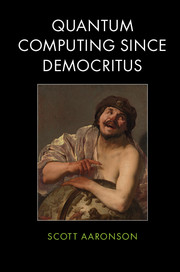Book contents
- Frontmatter
- Dedication
- Contents
- Preface
- Acknowledgments
- 1 Atoms and the void
- 2 Sets
- 3 Gödel, Turing, and friends
- 4 Minds and machines
- 5 Paleocomplexity
- 6 P, NP, and friends
- 7 Randomness
- 8 Crypto
- 9 Quantum
- 10 Quantum computing
- 11 Penrose
- 12 Decoherence and hidden variables
- 13 Proofs
- 14 How big are quantum states?
- 15 Skepticism of quantum computing
- 16 Learning
- 17 Interactive proofs, circuit lower bounds, and more
- 18 Fun with the Anthropic Principle1
- 19 Free will
- 20 Time travel
- 21 Cosmology and complexity
- 22 Ask me anything
- Index
- References
12 - Decoherence and hidden variables
Published online by Cambridge University Press: 05 April 2013
- Frontmatter
- Dedication
- Contents
- Preface
- Acknowledgments
- 1 Atoms and the void
- 2 Sets
- 3 Gödel, Turing, and friends
- 4 Minds and machines
- 5 Paleocomplexity
- 6 P, NP, and friends
- 7 Randomness
- 8 Crypto
- 9 Quantum
- 10 Quantum computing
- 11 Penrose
- 12 Decoherence and hidden variables
- 13 Proofs
- 14 How big are quantum states?
- 15 Skepticism of quantum computing
- 16 Learning
- 17 Interactive proofs, circuit lower bounds, and more
- 18 Fun with the Anthropic Principle1
- 19 Free will
- 20 Time travel
- 21 Cosmology and complexity
- 22 Ask me anything
- Index
- References
Summary
Why have so many great thinkers found quantum mechanics so hard to swallow? To hear some people tell it, the whole source of the trouble is that “God plays dice with the universe” – that, whereas classical mechanics could in principle predict the fall of every sparrow, quantum mechanics gives you only statistical predictions.
Well, you know what? Whoop-de-doo! If indeterminism were the only mystery about quantum mechanics, quantum mechanics wouldn't be mysterious at all. We could imagine, if we liked, that the universe did have a definite state at any time, but that some fundamental principle (besides the obvious practical difficulties) kept us from knowing the whole state. This wouldn't require any serious revision of our worldview. Sure, “God would be throwing dice,” but in such a benign way that not even Einstein could have any real beef with it.
The real trouble in quantum mechanics is not that the future trajectory of a particle is indeterministic – it’s that the past trajectory is also indeterministic! Or more accurately, the very notion of a “trajectory” is undefined, since until you measure, there’s just an evolving wavefunction. And crucially, because of the defining feature of quantum mechanics – interference between positive and negative amplitudes – this wavefunction can’t be seen as merely a product of our ignorance, in the same way that a probability distribution can.
- Type
- Chapter
- Information
- Quantum Computing since Democritus , pp. 160 - 185Publisher: Cambridge University PressPrint publication year: 2013



